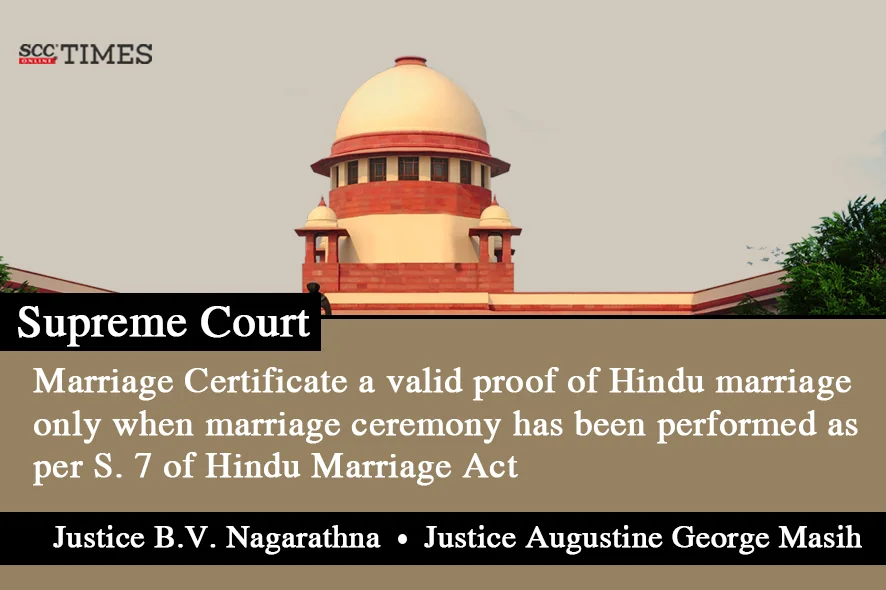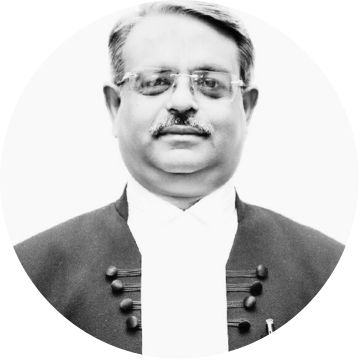Supreme Court: In a transfer petition filed by the petitioner seeking transfer of the divorce petition under Section 13(l)(ia) of the Hindu Marriage Act, 1955 pending before the Family Court, Muzaffarpur, Bihar to Family Court, Ranchi Jharkhand, the Division Bench of B.V. Nagarathna and Augustine George Masih, JJ. has declared that the ‘marriage’ between the parties is not a ‘Hindu marriage’ having regard to the provisions of Section 7 of the Hindu Marriage Act, 1955(‘HMA’). Consequently, the certificate issued by the Vadik Jankalyan Samiti and Certificate issued under the Uttar Pradesh Registration Rules, 2017 was declared null and void. The Court further declared that the petitioner and respondent were not married in accordance with the Act’s provisions and therefore have never acquired the status of husband and wife.
Further, the Bench held that if a certificate is issued stating that the couple had undergone marriage and if the marriage ceremony had not been performed in accordance with Section 7 of the Act, then the registration of such marriage under Section 8 would not confer any legitimacy to such a marriage. A certificate of marriage is a proof of validity of Hindu marriage only when such a marriage has taken place and not in a case where there is no marriage ceremony performed at all.
Background:
The petitioner and respondent are trained commercial pilots. They claimed to have ‘solemnized’ their marriage on 07-07-2021. They obtained a “marriage certificate” from Vadik Jankalyan Samiti (Regd.). Based on this certificate, they obtained a “Certificate of Registration of Marriage” under the Uttar Pradesh Marriage Registration Rules, 2017. The respective families of the parties fixed the date for performing the marriage ceremony as per Hindu rites and customs on 25-10-2022. Meanwhile, the petitioner and respondent lived separately but nevertheless, differences ignited between them. According to the petitioner, there was demand for dowry made by respondent’s family.
On 17-11-2022, the petitioner filed an FIR under Sections 498-A, 420, 506, 509, 34 of the Penal Code, 1860 (‘IPC’) and Sections 3,4 of the Dowry Prohibition Act, 1961 (‘DP Act’) against the respondent and his family members alleging harassment.
Thereafter in 2023, the respondent approached the Family Court, Muzaffarpur, Bihar by filing a petition for divorce under Section 13(1)(ia) of the Hindu Marriage Act, 1955(‘HMA’) Being aggrieved by this, as the petitioner is currently residing in Ranchi, Jharkhand with her parents, she filed the present transfer petition.
Analysis:
The Court noted that as per the parties there was no “marriage” solemnized by them since no customs, rites and rituals were performed. However, due to certain exigencies and pressures, they were constrained to obtain the certificate from Vadik Jankalyan Samiti (Regd.) and based on that certificate they sought registration under the Uttar Pradesh Registration Rule, 2017 and a “Certificate of Marriage” was issued by the Registrar of Marriages. Thus, when there was no Hindu marriage which took place between them, the issuance of the said certificate is of no consequence. The parties prayed for declaring that no marriage took place between them and thereby permit them to lead their independent lives.
The Court also noted that a joint application has been filed under Article 142 of the Constitution on parties own free volition, without there being any coercion or undue influence from any side. In the said joint application, the petitioner has sought for quashing of Maintenance Case, the Criminal Case and the proceedings thereunder against the respondent and his parents.
The Court took note of Section 7 of HMA, 1955, which speaks about ceremonies of a Hindu marriage. The Court noted Sub-section (1) uses the word “solemnised”, which means to perform the marriage with ceremonies in proper form. Unless and until the marriage is performed with appropriate ceremonies and in due form, it cannot be said to be “solemnised”.
The Court said that for a valid marriage under the Act, the requisite ceremonies have to be performed and there must be proof of performance of the said ceremony when an issue/controversy arise. Unless the parties have undergone such ceremony, there would be no Hindu marriage according to Section 7 of the Act and a mere issuance of a certificate by an entity in the absence of the requisite ceremonies having been performed, would neither confirm any marital status to the parties nor establish a marriage under Hindu law.
The Court the marriage certificate produced along with the application filed under Article 142 of the Constitution.
The Cour took note of Section 8 of the Act and said that it is open for two Hindus married under the provisions of the Act to have their marriage registered provided they fulfil the conditions laid down therein regarding performance of requisite ceremonies. It is only when the marriage is solemnised in accordance with Section 7, there can be a marriage registered under Section 8.
The Court said that the registration of Hindu marriages under Section 8 is only to facilitate the proof of a Hindu marriage but for that, there has to be a Hindu marriage in accordance with Section 7 of the Act inasmuch as there must be a marriage ceremony which has taken place between the parties in accordance with the said provision. Although the parties may have complied with the requisite conditions for a valid Hindu marriage as per Section 5 of the Act in the absence of there being a “Hindu marriage” in accordance with Section 7 of the Act, i.e., solemnization of such a marriage, there would be no Hindu marriage in the eye of law.
Therefore, the Court held that if a certificate is issued stating that the couple had undergone marriage and if the marriage ceremony had not been performed in accordance with Section 7 of the Act, then the registration of such marriage under Section 8 would not confer any legitimacy to such a marriage. A certificate of marriage is a proof of validity of Hindu marriage only when such a marriage has taken place and not in a case where there is no marriage ceremony performed at all.
The Court observed that a Hindu marriage is a sacrament and has a sacred character. In Hindu Law, as already noted, marriage is a sacrament or a samskara. It is the foundation for a new family. In the absence of any solemnisation of a marriage as per the provisions of the Act, a man and a woman cannot acquire the status of being a husband and a wife to each other.
The Bench deprecated the practice of young men and women seeking to acquire the status of being a husband and a wife to each other and therefore purportedly being married, in the absence of a valid marriage ceremony under the provisions of the Act such as in the instant case where the marriage between the parties was to take place later.
The Court said that in several instances for “practical purposes”, a man and a woman with the intention of solemnisation of their marriage at a future date seek to register their marriage under Section 8 of the Act based on a document which may have been issued as proof of ‘solemnisation of their marriage’. However, it said that in any such registration of a marriage before the Registrar of Marriages and a certificate being issued thereafter would not confirm that the parties have ‘solemnised’ a Hindu marriage.
The Court also noted that parents of young couples agree for registration of a marriage to apply for Visa for emigration to foreign countries where either of the parties may be working “in order to save time” and pending formalising a marriage ceremony. As per the Court, such practices must be deprecated.
The Court said that customary ceremonies, with all its attendant geographical and cultural variations is said to purify and transform the spiritual being of an individual. The HMA solemnly acknowledges both the material and spiritual aspects of this event in the married couple’s lives It follows that the critical conditions for the solemnizing of a Hindu marriage should be assiduously, strictly and religiously followed. Thus, the genesis of a sacred process cannot be a trivial affair. The sincere conduct of and participation in the customary rites and ceremonies under Section 7 of the Hindu Marriage Act, 1955 ought to be ensured by all married couples and priests who preside over the ceremony.
The Court remarked that the promises made to each by the parties to a Hindu marriage and the oath taken by them to remain friends forever lay the foundation for a life-long commitment between the spouses which should be realized by them. If such commitment to each other is adhered to by the couple, then there would be far fewer cases of breakdown of marriages leading to divorce or separation.
In the instant case, the Bench declared the ‘marriage’ between the parties is not a ‘Hindu marriage’ having regard to the provisions of Section 7 of the Act. Consequently, the certificate issued by the Vadik Jankalyan Samiti and Certificate issued under the Uttar Pradesh Registration Rules, 2017 was declared null and void.
The Court further declared that the petitioner and respondent were not married in accordance with the Act’s provisions and therefore have never acquired the status of husband and wife.
The Court also quashed the three cases filed by the parties against each other.
CASE DETAILS
|
Citation: Appellants : Respondents : |
Advocates who appeared in this case For Petitioner(s): For Respondent(s): |
CORAM :











The Supreme Court emphasizes the sacredness of Hindu marriage ceremonies, stating that a valid marriage certificate requires compliance with Section 7 of the Hindu Marriage Act. 🕊️💍 Certificates issued without proper ceremonies hold no legal standing, underscoring the importance of traditional rites in establishing marital legitimacy under Hindu law.